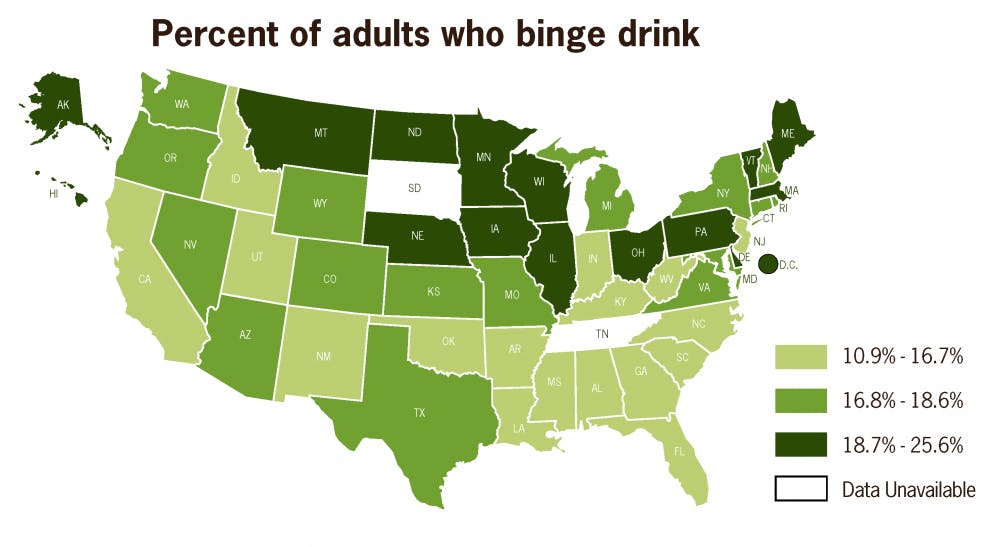The National Institute on Alcohol Abuse and Alcoholism defines binge drinking as “a pattern of drinking that brings blood alcohol concentration levels to 0.08 g/dL” — this usually occurs after about four drinks in two hours for women, and five drinks in two hours for men.
For college students, this may not seem like a lot the 2015 National Survey on Drug Use and Health found that 37.9 percent of college students reported binge drinking in the past month.
Excessive drinking can have a variety of consequences, Robert Klesges, a University professor of public health sciences and co-director of the Center for Addiction and Prevention, said in an email to The Cavalier Daily.
“The consequences include lower grades, increased probability of dropping out of school, DUIs, arrest, risky sexual encounters, and a whole [lot of] other negative things that can happen when your mind is not working correctly,” Klesges said.
Klesges also noted that consequences can follow students after college, stating that binge drinking often persists over time, and that long-term binge drinking can lead to both cancer and heart disease.
In the short term, heavy drinking can often lead to students turning up at the local emergency room — from 2010 to 2013, nearly 420,000 people aged 18-20 were presented to an emergency department for an alcohol-related reason, according to the Substance Abuse and Mental Health Services Administration.
According to Dr. Chris Holstege, who is chief of the University’s Division of Medical Toxicology and executive director of Student Health, intoxicated patients in the emergency department are typically monitored to ensure that vomit doesn’t enter the airway and that they are breathing without difficulty.
“[Monitoring] can simply entail having the patient rest and allow the alcohol to metabolize, or in more severe cases the patient may need to be on respiratory and cardiac monitoring,” Holstege said. “Rarely, we have to put an acutely intoxicated patient on life support if the patient is not breathing or there is a risk of vomit entering their airway … No patient ever has their stomach ‘pumped’ — that is a myth for alcohol intoxication.”
Additionally, students’ conditions are kept private, Holstege emphasized, as all patients are under the protection of HIPAA laws and are confidentially monitored in the emergency department.
Several on-Grounds organizations work to educate students on binge drinking and offer students information and guidance if they would like to scale back their drinking. The Office of Health Promotion, housed in Elson Student Health, consists of the Gordie Center for Substance Abuse Prevention, the Stall Seat Journal, ADAPT and the Peer Health Educators program — all of which educate students about unhealthy drinking.
Logan Brich, a third-year College student and Peer Health Educator, said PHEs are trained in numerous topics from sexual health, nutrition, mental well-being and drug and alcohol safety. They educate students through individual patient education sessions and outreach presentations at Greek organizations and other CIOs on Grounds.
“Our biggest outreach programming for binge drinking is the Fourth Year 5K, which is an effort to provide alternative programming on the day of the last home football game, not just that, but to get the community together and remind them that we're all here for each other, and you can always reach out to somebody if you need them,” Brich said.
According to Brich, PHEs see culture change through education as being the most effective tool to combat binge drinking. PHEs educate students both one-on-one and in groups, and Brich stated that cultivating a feeling of community support can go a long way to improving alcohol safety as well as other aspects of student health.
Brief Alcohol Interventions, or BAIs, are also highly effective in reducing excessive binge drinking, according to Klesges.
“This is typically a one session intervention that is non-judgmental and provides helpful guides to prevent excessive drinking,” Klesges said.
The BASICS program, through the Gordie Center for Substance Abuse Prevention, is one such program, which consists of an online survey and a meeting to discuss one’s results. The program is designed to “provide a confidential, non-judgemental environment to assess personal risk, identify potential changes that could work for each student, and help reduce risk for developing future problems associated with substance use,” according to the Gordie Center website.
Similarly, in their outreach, PHEs are non-judgmental and try to meet students where they are rather than shaming them or forcing them to make changes, Brich said.
“Our biggest mission is that people are making choices that are right for them and that they feel are safe and healthy for them,” Brich said. “[…] We don't necessarily go out, wag our finger at people, and say, 'You're binge drinking, you can't do that'. It's really about making sure that people feel that somebody has their back, that they're supported if they do decide to make the change that’s healthiest for them.”







